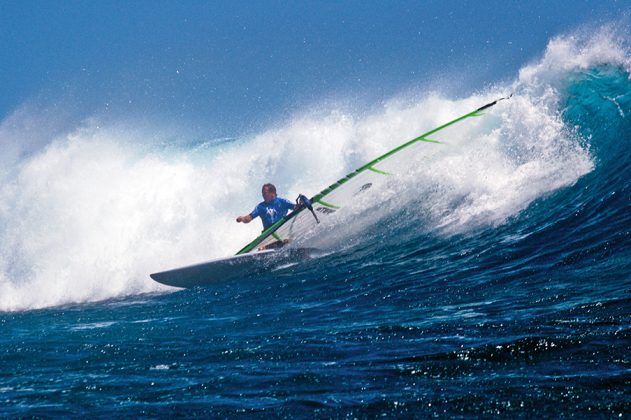Continuing the mental theme this month, Harty shares a few instances where a piece of non-technical advice, has made an immediate and genuine difference.
For some time I harboured a healthy suspicion of Sports psychologists. My first session with a very earnest young gentleman seemed primarily to be about giving pseudo-scientific names for stuff we already knew. For example:
‘Assumed assimilation.’ That’s thinking someone wants to do the same as you.
‘Altered state.’ Auto-pilot.
‘Attention focus.’ Not being distracted.
And my favourite: ‘Internal monologue’ which turned out to mean ‘talking to yourself.’ But then at one conference I met a guy who was really good. He was a tennis coach turned psychologist. Despite working with some top performers, he was very grounded and ‘un-Guru’ like. He too laughed at the psychobabble and admitted that much of what he preaches is pure common sense. However, he also pointed out that common sense is not a quality everyone is blessed with – especially when they’re stressed or pressured. Completely out of the blue I described a windsurfing situation and asked him for a psychological tip. The one he gave was simple, brilliant and effective – and I shall reveal it shortly. After that I became a lot more open to the idea of mental coaching. Here are two bits of advice I’ve received over the years that were so simple and yet eternally valuable.
The tax return
Sailing waves is ridiculous fun; getting trashed and held under by them, less so. But it’s part of the game so you better learn to deal with it or get out of the pool. The first time it properly happens to you, it is very frightening – because it’s unexpected. You’re a fit wave sailing type with a fine set of lungs able to hold your breath for a minute or more … static in the shallow end of a swimming pool. But then are suddenly shocked by how quickly you run out of gas when your heart rate is around 200 bpm, which it’s likely to be when a wall of water the size of a hotel is threatening your very existence.
On an early trip to Maui, I was sailing an outer reef called Spartans. It’s Jaws-esque, but you don’t need a boat to get to it. It was the first time I’d sailed waves of that size. Long story short, in the failing light I got disoriented, sailed in a bit too far over the reef and got cleaned up by a monster. Such was the turbulence and ferocity of the spin cycle, I experienced that condition I’d only read about from avalanche survivors, where you have no idea which way is up or down and so which way to dig or swim. After 10 seconds or more, my screaming lungs pushed the panic button and I thrashed away dragging my hands helplessly through the bubbles to absolutely no effect. I did finally surface only to relive the experience 2 more times. That I’m writing this gives away the happy ending but I had all the symptoms of a drowning man – sudden, blissful calm, tunnel vision etc. The next day I bumped into Anders Bringdal on the beach. I’d met Anders in Western Oz the year before and although originally a racer, he was gaining quite a reputation as a big wave sailor. I asked him what he advised in dire hold-down situations.
“Cover your head and think about your tax return.” He said without drawing breath.
“When it’s that big, it’s not going to let you up until it’s good and ready, so think of something really mundane and the time soon passes.”
And surely it does. The less you thrash about and the calmer you are, the longer your oxygen lasts. And so long as you took a breath, you will float to the surface … eventually. In crisis situations the mind is like a toddler in that it’s much easier to distract it than it is to reason with it. So neat was that advice that I got him to repeat it on my video: SERIOUS ABOUT WAVES Part 1. Thanks Anders.
The Positive Tennis Man
So back to the conference with the aforementioned tennis coach turned psychologist. His talk had centred on the effects of ‘positive thinking’ at a time before those 2 words had become the email signature of every budding motivational speaker. But the difference here was that he was backing it up with solid advice, strategies and data. He described an experiment he’d conducted with a group of players. He placed a disc on the court where the service line meets the tramline and they got a point every time they hit it. In the next round the test was the same except they got a point deducted every time they missed it. In that round their success rate dropped by 50% and it was all down to swapping a positive focus for a negative one. He said in the first round the mood was buoyant with everyone cheering a hit. In the second, the moment they focused on trying NOT to miss it, rather than to hit it, their whole body language changed; the mood was sombre and their stroke play much tighter and less free.
At the bar we talked about the subject of ‘choking’ and why even the best wilt under pressure; double faulting, for example, on match point; scuffing the penalty to win the World Cup; or as had just happened to me the day before, falling in on the last tack of the last beat of the last race and thereby throwing away a podium finish and about £500. Tom the tennis coach didn’t even know what a tack was; but when I explained, he asked, “what were you thinking as you went into that last tack?” I told him I was obviously telling myself: “don’t fall in!”
“So how about next time,” he said, “you just tell yourself to see how fast you can get around the mast.”
That was it. I’m not saying I’ve never blown a tack since but that simple change of mind set, swapping a negative instruction for a positive one, completely changed my approach to pressure situations.
I hope you English boys at Euro 16 are reading this…
PH 14th June 2016
PHOTO Put this down to ‘legitimate business expenses’ to be logged on page 7 subsection 2a …under ‘survival training’ ..which must be VAT free!..
Photo Hart Photography


